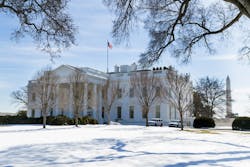What to Watch for in Telecom with Trump Set to Take Office
As the dust settles from the 2024 election in the U.S., many are wondering what it will mean for the industries they work in, all of which can face numerous upheavels directed by political agendas.
So what about telecom? What should we be watching for in the coming years that will affect the building of broadband networks, as well as the particular programs, technologies, and economics that are at stake?
FCC Chair
Some analysts expect Brendan Carr to become the new FCC Chair, replacing Jessica Rosenworcel. As a republican, Carr would likely be aligned with the administration on policy relating to telecom. Notably, Carr was the author of a chapter of the "Project 2025" policy document from the Heritage Foundation, a conservative think tank, which could impact telecom in a variety of ways.
Carr has also shown alignment with Elon Musk, dissenting from the FCC decision to reject Starlink's RDOF application.
BEAD
On Joe Rogan's podcast, Donald Trump said "We’re spending a trillion dollars to get cables all over the country, up to upstate areas where you have two farms, and they are spending millions of dollars to have a cable. Elon can do it for nothing."
It's already clear that reaching BEAD goals will result in some alternative technologies being used to fill gaps. But equating Starlink technology with fiber for purposes of BEAD grants could certainly throw a wrench into the program.
But the more existential questions surrounding BEAD are a huge unknown. We know where Brendan Carr stands on certain elements of BEAD.Carr criticized the "diversity, equity and inclusion requirements, climate-change rules, price controls, preferences for union labor, and schemes that favor government-run networks."
Questions remain about what the NTIA will look like in terms of staffing and priorities. It may become more clear in the future what will happen to BEAD, but unfortunately, right now there are too many unknowns.
[Note: you can watch this story in the clip below, on the BEAD/BABA Rundown:]
Net Neutrality
Net Neutrality has gone back and forth, back and forth, and Republicans don't seem to be enthusiastic about these policies. And since the Supreme Court's decision on the Chevron Defense, it's just kind of been hanging there.
So, what now? Well, it seems likely that Net Neutrality may be threatened by a Trump administration and Republican legislative priorities.
Starlink
Logically, it would seem that Elon Musk will have an easier time in a Trump administration. Starlink's relationship with the FCC would likely shift if Carr were to become chair, as mentioned earlier.
Musk has faced complications in efforts to receive federal subsidies, and it would seem he is hoping that a friendlier administration would benefit these efforts.
And Musk is critical of BEAD, and is not always aligned with the fiber industry about how best to connect rural America. With BEAD decisions being made at the state level, it will be interesting to see what plays out.
After the vote, a vibe check
What are your top business priorities now that we know the outcome of the presidential election? And are you confident in the future Trump administration’s approach to key economic issues? Let us know via this quick six-question poll of B2B leaders! We look forward to sharing the results with you soon.
About the Author
Joe Gillard
Executive Editor
Joe Gillard is a media professional with over 10 years of experience writing, editing, and managing the editorial process across a spectrum of innovative industries. Joe strives to deliver the best possible editorial product by focusing on the needs of the audience, utilizing the data available, and collaborating with a talented team.

